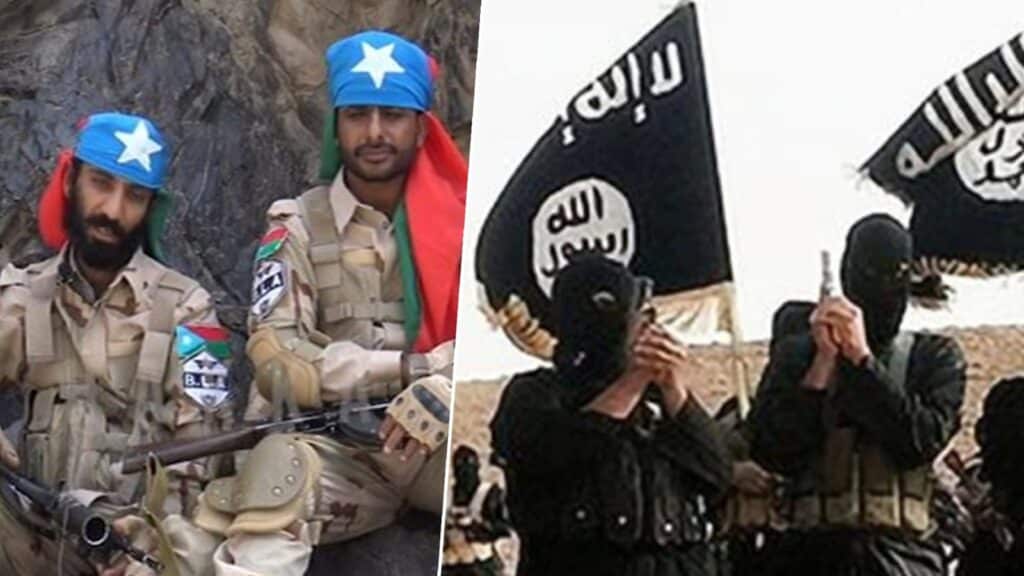The security landscape of Balochistan is entering a new phase of volatility as Islamic State Khorasan Province (ISIS-K) formally declares war on the Baloch Liberation Army (BLA) and other nationalist movements. The announcement marks a significant shift in ISIS-K’s operational strategy, expanding its targets beyond state institutions to now include nationalist insurgent groups and rights-based political movements.
ISIS-K’s Unexpected Move
In an unexpected move, ISIS-K released a booklet denouncing ethnic nationalist movements in Pakistan — specifically targeting Baloch and Pashtun organizations. The group labeled these movements as “un-Islamic,” condemning entities such as the Baloch Yakjehti Committee and its leader Mahrang Baloch, as well as the Pashtun Tahafuz Movement (PTM) and its leader Manzoor Pashteen.
Shortly after the booklet’s release, ISIS-K issued an audio statement justifying its declaration of war against the BLA, citing the killing of its fighters in Balochistan’s Mastung district as provocation. This is the first time ISIS-K has openly targeted nationalist insurgents in Pakistan — a development that threatens to further destabilize an already fragile region.
ISIS-K’s Violent Footprint in Balochistan
Since 2016, ISIS-K has been linked to at least 33 attacks in Balochistan, resulting in 436 deaths and 691 injuries. These attacks have primarily targeted:
Shrines and churches (8 major incidents)
Security forces and polio workers
Political figures, particularly from Jamiat Ulema-e-Islam (JUI-F)
Chinese nationals and foreign interests
Notable attacks include assassination attempts on JUI-F leaders Maulana Abdul Ghafoor Haideri and Hafiz Hamdullah, as well as the killing of BAP leader Siraj Raisani in 2018 and a failed attack on former President Arif Alvi.
Geographical Footprint
ISIS-K’s operational strongholds in Balochistan are primarily in central-western districts:
Mastung, Quetta outskirts, Khuzdar, Kalat, Bolan, and Sibi
The group also reportedly operates training camps near the Sindh-Balochistan border, recruiting youth from ethnic Baloch and Brahui communities.
Ideological Rift with JUI-F and Taliban
ISIS-K has consistently targeted JUI-F leaders, viewing the party as an ideological ally of the Afghan Taliban — a group ISIS-K labels as a nationalist, Western-backed movement. The two share fundamental differences over the role of nation-states and the concept of a global Islamic Caliphate.
ISIS-K follows an ultra-strict Salafi ideology, which clashes with the Deobandi-influenced networks in Balochistan that support JUI-F. This ideological divide explains the group’s persistent hostility toward JUI-F despite its own Islamist credentials.
Targeting of Nationalist Movements
With its recent declaration, ISIS-K is now openly targeting:
Baloch insurgent groups like the BLA
Pashtun civil rights activists
Ethno-nationalist political entities
ISIS-K’s characterization of nationalism as anti-Islamic now puts both violent insurgents and peaceful political activists in its crosshairs, dramatically widening its battlefield.
The Road Ahead: Intra-Insurgency Conflict?
Until now, Baloch nationalist groups and ISIS-K had largely avoided direct confrontation, despite overlapping operational zones. However, with ISIS-K’s recent declaration, violent clashes between jihadists and nationalists could escalate.
This development presents a complex challenge for the Pakistani state:
Strategic Dilemma: A war between two anti-state actors may weaken both, but it also risks massive collateral damage and further chaos.
Security Vacuum: An increasingly crowded battlefield in Balochistan could lead to new alliances, defections, or regional spillovers.
Increased Radicalization: ISIS-K’s recruitment from marginalized ethnic communities may grow, especially if it frames its battle as one against both the state and secular nationalists.





